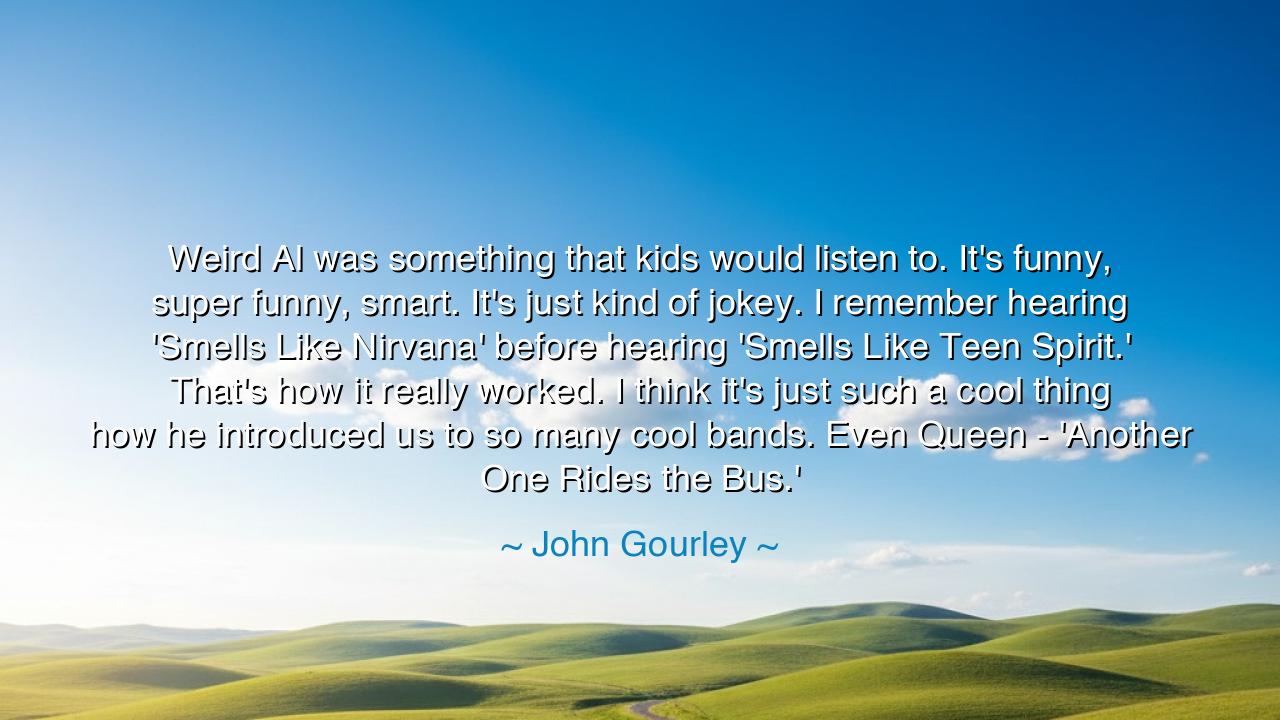
Weird Al was something that kids would listen to. It's funny
Weird Al was something that kids would listen to. It's funny, super funny, smart. It's just kind of jokey. I remember hearing 'Smells Like Nirvana' before hearing 'Smells Like Teen Spirit.' That's how it really worked. I think it's just such a cool thing how he introduced us to so many cool bands. Even Queen - 'Another One Rides the Bus.'






When John Gourley reflected, “Weird Al was something that kids would listen to. It’s funny, super funny, smart. It’s just kind of jokey. I remember hearing ‘Smells Like Nirvana’ before hearing ‘Smells Like Teen Spirit.’ That’s how it really worked. I think it’s just such a cool thing how he introduced us to so many cool bands. Even Queen – ‘Another One Rides the Bus,’” he was not simply recalling a childhood memory, but naming a profound truth about how art often comes to us in disguise. Sometimes the path to greatness is not solemn, but playful; sometimes the introduction to culture’s giants comes not through their own voices, but through the laughter and wit of another.
The origin of this truth lies in the strange alchemy of parody. To parody a song is to strip it of its reverence, to make it approachable, to open a door for those who might otherwise never enter. For the young, a band like Nirvana or a legend like Queen may feel distant, too heavy, too serious. But through Weird Al’s humor, they were transformed into something joyous, something that children could hold without fear. And in that laughter, the names of the greats were planted in memory, ready to be discovered in their original form.
This is not a new phenomenon. In the ancient days of Greece, Aristophanes, the comic playwright, mocked the solemn philosophers and tragic poets of his time. His plays were bawdy, ridiculous, and filled with jokes, yet through them the citizens came to know the names and ideas of the great thinkers. Laughter was the gateway into learning. In the same way, Weird Al became a bridge: a jester who smuggled the music of giants into the ears of the young.
Gourley’s memory of hearing “Smells Like Nirvana” before “Smells Like Teen Spirit” captures this beautifully. What seems backwards is in fact natural: the parody clears the ground, makes the strange familiar, and prepares the soul to receive the original with joy. By first laughing at the distorted image, the child becomes curious about the truth behind it. And when the real song is finally heard, it arrives not as an alien sound but as a friend already introduced.
The mention of Queen and “Another One Rides the Bus” deepens the lesson. Here was a band of titans, their music grand and operatic, their stage presence towering. Yet through parody, even they became approachable, human, and funny. And once a child laughs with the parody, the reverence for the original follows. What begins in humor often ends in awe. Thus, Gourley honors Weird Al not only as a comedian, but as a teacher, a hidden guide who pointed an entire generation toward the treasures of music history.
The deeper meaning here is that art need not always be serious to be significant. Humor is not the enemy of greatness; it is one of its most powerful allies. For what is laughter if not recognition in disguise? The parody only works if the original has weight; the joke only lands if the truth behind it matters. In this way, parody becomes both tribute and introduction, both a celebration and a doorway.
The lesson we must take is clear: do not despise the playful beginnings of art. What seems silly may be the very path that leads to reverence. Allow humor to teach you, allow parody to guide you, and know that joy is as sacred as solemnity in the shaping of the soul. Many who mocked at first grew later into reverence; many who laughed as children became creators themselves, inspired by the very names first whispered to them in jest.
Practical wisdom follows. Parents and teachers, do not dismiss what children find funny—look deeper, for within it may be a bridge to greater art. Young listeners, follow the path of parody into the originals, and learn to honor the source behind the laughter. And to all: remember that the jester often carries the torch of the sage, illuminating the way with humor.
Thus, John Gourley’s words rise beyond nostalgia. They remind us that Weird Al, with his laughter and wit, was not merely a comedian but a gatekeeper, a cultural guide. Through parody, he gave generations the names of Nirvana, of Queen, and countless others. And so the teaching is eternal: sometimes the doorway to greatness is carved not in stone, but in laughter. Enter it, and you will find that even jesters can lead you to kings.






AAdministratorAdministrator
Welcome, honored guests. Please leave a comment, we will respond soon